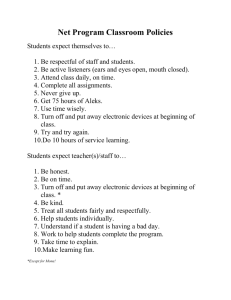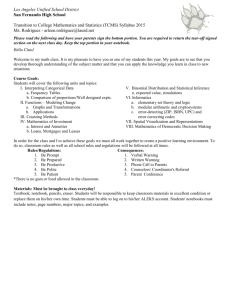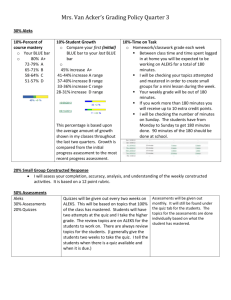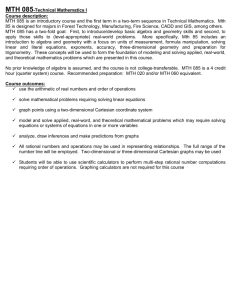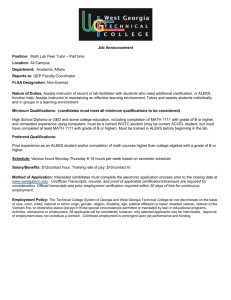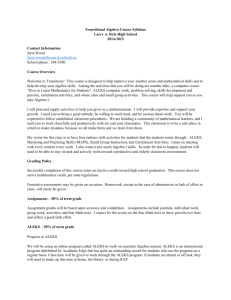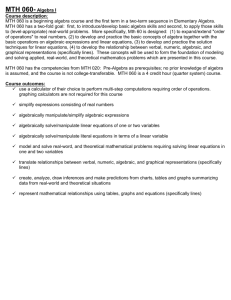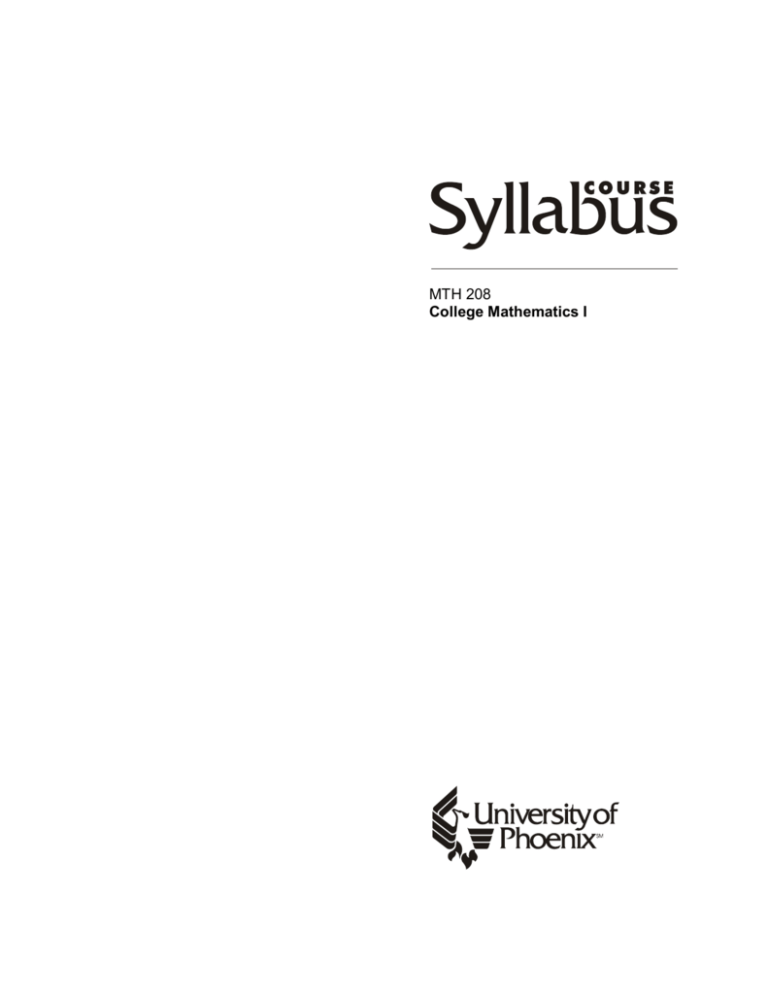
MTH 208
College Mathematics I
MTH 208 College Mathematics I
Program Council
The Academic Program Councils for each
college oversee the design and
development of all University of Phoenix
curricula. Council members include full-time
and practitioner faculty members who have
extensive experience in this discipline.
Teams of full-time and practitioner faculty
content experts are assembled under the
direction of these Councils to create specific
courses within the academic program.
Copyright
Copyright 1999, 2002, 2003, 2004, 2005, 2006,
2007, and 2008 by the University of Phoenix. All rights
reserved.
University of Phoenix® is a registered trademark of
Apollo Group, Inc. in the United States and/or other
countries.
Microsoft®, Windows®, and Windows NT® are
registered trademarks of Microsoft Corporation in the
United States and/or other countries. All other company
and product names are trademarks or registered
trademarks or their respective companies. Use of these
marks is not intended to imply endorsement,
sponsorship, or affiliation.
Edited in accordance with University of Phoenix®
editorial standards and practices.
MTH208r4
MTH 208 College Mathematics I
Course Syllabus
University of
Phoenix
MTH208
Course Title:
MTH 208 College Mathematics I
Course Schedule:
Mondays 06/14/2010 - 07/19/2010 (No meeting the 5th of July!)
Course
Location/Times/Forum:
Arlington Learning Center
Required Text:
Dugopolski, M. (2009). Elementary and intermediate algebra (3rd
ed.). New York: McGraw-Hill.
6pm to 10pm*
Note: All required text materials can be found on the MTH 208
course
page. The
page can be accessed through the University of Phoenix
Student and Faculty Web site at https://ecampus.phoenix.edu/
Electronic Resources:
ALEKS® System, the OLS, and a Web page I keep the syllabus and
large resources stored for you:
http://www.bikerjohn.com/classes/mth208_1/
ALEKS® instructor’s course code:
Course code: 93FMV-6V6QQ
Students are required to read all materials available at the
Course Materials site for this course on
http://ecampus.phoenix.edu.
Bring some version of the textbook and example problems to class
every week (along with note cards and blank paper).
Instructor’s Name:
John Ensworth
Telephone:
703-618-6773 (cell), 703-462-9658 (home)
University of Phoenix E-mail
Address:
jenswort@email.uophx.edu
Alternative (personal) E-mail
Address:
johnensworth@earthlink.net
Availability:
After class and by appointment
(see details below)
(for large attachments)
Snail-Mail: Available upon request as a last resort!
* Expect class to run to 10pm! Leaving early except in emergency
will hurt your class participation grade and (indirectly) your overall
class performance.
Facilitator Availability
I am generally available from 9 a.m.- 9 p.m. Eastern Time on most days, but I attempt to reserve
Sunday for my family. During the week, I am online most of the time during that 9 a.m.-9 p.m.
time frame. On Saturdays, I tend to be online in the morning only. If these times are not
convenient for you, please let me know. I will be happy to accommodate your schedule, if
possible. I provide you with these times to make it easier to communicate with me, and not to limit
1
MTH208r4
MTH 208 College Mathematics I
our contact. I want you to know that, should you need to contact me outside these time frames,
you should not hesitate to do so.
For emergencies, when you are not able to gain access to messages on the Online Learning
System (OLS), please send a message to my personal email address. In the event a third party
needs to contact me, please direct them to my contact information listed under "facilitator
information." No third party should use your login credentials to gain access to the classroom.
Online Learning System Forums
We will have a set of Online Learning System forums available to us during this class. To access
the forums, click on the Go to class link on your student website.
These web-based forums provide you with:
1. A common area solely for our class group (Main forum) where you can post questions between
our on-campus workshop meetings;
2. A Chat Room forum which you can use for non-class interactions with classmates (be sure to
honor the Student Code of Conduct in this, and every, forum!);
3. Electronic access to the course syllabus which will be used in this class (see the syllabus in the
Course Materials forum);
4. Electronic venues for Learning Team meetings and team paper drafts to use as each team
deems best (I will assign a specific Learning Team forum for each team’s use during our first oncampus workshop meeting). Learning Team meetings should be documented here regardless of
the mode students chose to actually meet; and
5. A personalized electronic drop-box – Individual Forum - for completed assignments. Students
will not be able to see or access any private forum except the one created for him or her
individually. Feedback will also be provided through this forum.
There are no online attendance or participation requirements during this course. All attendance
and participation activity will occur only during our on-campus workshop meetings. The forums
exist to enhance our ability to communicate throughout the course.
If you have any questions about the class forums, please let me know during our on-campus
class time or by posting your question(s) in the Main forum.
Where to Go to Class: Your Course Forums
Main: This is the main forum for the class and is where you may ask questions between class
meetings. It has read-and-write access for everyone. That means all other students will see
information posted here (including your homework).
Chat-Room: This is a read-and-write access forum. It is designed as a place to discuss issues
not related to the course content.
Course-Materials: This is a read-only forum, which means you can read messages here but
cannot send any. This is where I will post the course syllabus and materials.
Learning-Team-A, B, C, D, E and F: These six Learning Team forums may be used as
workrooms for the learning teams. You will be assigned to one of these learning teams. All other
teams have access to these messages!
Individual Forum: You will see one forum with your name on it. This is a private forum, shared
only by you and me, the facilitator. Your classmates will not have access to this forum. This is
where you will post your individual assignments, and where I will post your feedback. You can
also ask questions here. However, if you have general questions about instructions of
assignments, please post those in the Main forum, since other students may benefit by that
exchange as well.
2
MTH208r4
MTH 208 College Mathematics I
There are no online attendance or participation requirements during this course. All attendance
and participation activity will occur only during our on-campus workshop meetings. The forums
exist to enhance our ability to communicate throughout the course.
If you have any questions about the class forums, please let me know during our on-campus
class time or by posting your question(s) in the Main forum.
____________________________________________________________________________
Welcome!
Mathematics, believe it or not, is the base level language of the universe and reality itself. If you
learn how to think 'math' you'll see and understand the world around you all that better (including
your checkbook and investments). I plan to make college algebra as digestible and enjoyable as
possible. Stick with it and keep that attitude positive!
Instructor Bio
I am currently the Senior Science Education Specialist at the Institute for Global
Environmental Strategies which is a non-profit organization formed (among other things) to
conduct independent reviews on all Earth and space science education products produced by or
for NASA. (www.strategies.org) My position is the one responsible for directly conducting these
reviews and yearly workshops at NASA centers and at the large education conferences (i.e.
NSTA, NCTM) that introduce the products that pass on the criteria of scientific accuracy and
classroom usability.
For the last decade I was a masters student and a PhD candidate in meteorology at the
University of Oklahoma. I have earned undergraduate degrees in physics, astronomy, geography
and meteorology with minors in math and computer science.
I became interested in astronomy in the 2nd grade and began to teach astronomy to cub scouts
and boy scouts by the 5th grade. I began to work for the Arizona State University planetarium
when Halley’s Comet paid the inner solar system a visit in 1985-1986 and taught the astronomy
labs, became head TA and eventually taught an astronomy class through the rest of the 80’s (as
an undergraduate). I have worked an internship at Steward Observatory, at the University of
Arizona, Tucson, site testing for the placement of the Mt. Graham observatory complex. I’ve also
observed at the 4-meter telescope at Kitt Peak, a 36” telescope at Kitt Peak, and at the MultiMirror Telescope at Mt. Whipple.
I’ve successfully run 49 astronomy nights for Norman residents and OU students and
students and the public in Virginia and Maryland and have worked at the Oklahoma City
Omniplex Planetarium for almost 10 years. I’ve taught astronomy for the college degree
completion program at Mid-America Christian University (formerly Mid-America Bible College) for
the last 3 years and am a member of the Oklahoma City Astronomy Club. I have also served an
internship at NASA Goddard Space Flight Center.
In environmental science and related fields, I began to study meteorology and earth science
th
in the 5 grade when my telescope got rained on during an freak night time desert thunderstorm.
Convinced I could forecast better than the guys in Phoenix, I began to study the weather. In
college I conducted the meteorological investigations for the placement (site testing) of the Mt.
Graham Observatory complex and helped astronomers understand what makes stars twinkle (it is
a blurring of the image caused by turbulence and density currents in the lower few hundred to a
thousand feet in the atmosphere). I also worked on a project to trace the origin of air pollution in
the Grand Canyon. As a graduate student I conducted field research on lightning, fine scale (time
and space) rainfall variations, aided in a geographic study of rainfall and plant distributions by
elevation at Black Mesa, OK, and chased tornadoes. I taught meteorology, earth system science
and helped with environmental geography courses throughout the 1990’s and into the 2000’s. I
keep the weather channel on enough at home to burn lines into the TV screen.
Mathematically, my areas of study require the highest levels of math out there (darn it) so I
have to speak Algebra, calculus, trigonometry and the like as second, third, fourth and so forth
languages. And, besides, math is FUN!
3
MTH208r4
MTH 208 College Mathematics I
Course Description
This course begins a demonstration and examination of various concepts of basic algebra. It
assists in building skills for performing specific mathematical operations and problem solving.
These concepts and skills serve as a foundation for subsequent quantitative business
coursework. Applications to real-world problems are emphasized throughout the course. Specific
applications to disciplines such as statistics, accounting, finance, and economics are
demonstrated and discussed. A variety of other applications, such as geometry, personal finance,
science, and engineering are also presented. Math is a language of logical thinking using
symbols and numbers to quantify. This course is the first half of the college algebra sequence,
which is completed in MTH 209 College Mathematics II.
TOPICS AND OBJECTIVES
Week One: Real Numbers
•
•
•
Identify the properties of real numbers.
Evaluate basic mathematical expressions involving real numbers.
Write mathematical expressions, equations, and inequalities.
Week Two: Linear Equations and Inequalities
•
•
•
Identify additive and multiplicative properties of equality.
Solve linear equations and linear inequalities.
Solve word problems using linear equations and linear inequalities.
Week Three: Graphing Linear Equations and Inequalities
•
•
•
•
•
•
•
Plot points on a Cartesian coordinate system.
Compute the slope of linear equations.
Graph linear equations and linear inequalities.
Write the equations of various lines given the graph of those lines.
Write the equations of various lines given points, intercepts, slopes, and parallel lines.
Apply the concepts of slope and intercept to real-life situations.
Solve word-problems using the concepts of direct and inverse variation.
Week Four: Systems of Linear Equations and Inequalities
•
•
•
•
•
Express problems as a system of linear equations.
Solve systems by graphing.
Solve systems using substitution and addition.
Identify dependent, independent, and inconsistent systems.
Solve word problems involving a system of linear equations and linear inequalities.
Week Five: Algebra Review
Complete all material not completed in first four weeks and review all topics and objectives from
Weeks One through Five.
4
MTH208r4
MTH 208 College Mathematics I
Point Values for the Course Assignments
ASSIGNMENTS
DUE
POINTS
Individual (70%)
Class Participation
All
15
Individual Exercises
W1 - W4 (+W5)
20 (4 each)
W3
5
Quizzes
W1 - W4
10 (2 each)
Learning Progress in ALEKS®
W1 - W4
10 (2 each)
W5
10
W2 - W5
30 (7.5
each)
Why Do I need Algebra? Short Paper
Final Examination
Learning Team (30%)
Team Exercises
Total
100
Policies and Procedures
For class policies, please see the “Policies” link on the left side of the Materials page for the
course on eCampus. Faculty and students/learners will be held responsible for understanding
and adhering to all policies contained within that link. University policies are subject to change so
please be sure to read them at the beginning of each class as it may have changed since your
last class. Policies may be slightly different depending on the modality in which you attend class.
If you have recently changed modalities it is important you read the policies governing your
current class modality.
Learning Teams
University of Phoenix students are expected to work effectively in diverse groups and teams to
achieve tasks. They must collaborate and function well in team settings as both leaders and
followers. They should respect human diversity and behave in a tolerant manner toward
colleagues and peers.
Several of the assignments in this class will be completed in Learning Teams of three to five
students. If you experience difficulties working with your team, you are expected to resolve them
within the team if possible. However, please feel free to contact me for guidance if you have
concerns in this area.
In order to create structure for your Learning Team, you will complete a Learning Team Charter.
Participation in the learning teams will be evaluated based on evaluations to be filled out and
turned in throughout the class. You need to be honest with your teammates throughout the
course and in completing the evaluations. One of the tasks you may be responsible for in your
career is evaluating your subordinates, as such this is a good place to practice constructive
criticism and praise.
After each Learning Team project, you will be asked to complete a Peer Evaluation to assess the
contributions of each member of your Learning Team (including yourself). I will take these Peer
5
MTH208r4
MTH 208 College Mathematics I
Evaluations into account when assessing individual contributions to the Learning Team projects
Because Learning Team projects are outcome-based, all members of your Learning Team will
generally earn the same grade for Learning Team projects. However, I reserve the right to report
different grades for different Learning Team members if I see a substantial imbalance in individual
contribution.
Extra Electronic Resources
I'll supply PowerPoint, Adobe Acrobat (pdf), and HTML files of the presentation materials as
well as many many worked problems in PDF documents to help you work most of the problems
in the book (except homework problems).
These are located at:
http://www.bikerjohn.com/classes/mth208_1/
I suggest bringing a laptop to class so you can view the example problem files OR that you
print them and bring them to class (including week 1).
What to bring to class.
Bring a laptop with the example problems OR the example problems printed out. Also be ready
to work from the textbook online OR printed out.
Bring blank paper to work problems in class.
Bring note cards to write down things you'll want to memorize.
A calculator may be helpful as well.
Preparation
Students are expected to do the required weekly learning in an independent manner. All
assignments, including readings, are to be completed before submissions are due.
Grading Criteria
Written papers are generally graded 70% for Content (includes response to assignment and
length required as described in the syllabus and assignment rubrics), 15% for Organization
(includes introduction, structure, theme development and summary/conclusion) and 15% for
Style and Mechanics (including spelling, grammar and punctuation, readability and proper
APA formatting). For Mathematics homework, 100% comes from the worked content. Show
your work to get partial credit for incorrect answers.
Grading Policies
All written work will be graded according to APA guidelines. Assessments of written assignments
will be based on style, content and format, including such items as clarity of communication,
sentence and paragraph construction, punctuation, spelling, and grammar. Written assignments
should be submitted on Online Learning System Forums (OLS). Assignments should be neatly
typed and follow the guidelines of the individual assignment in terms of length and content. All
6
MTH208r4
MTH 208 College Mathematics I
work will be graded on a 100-point scale (see above). Grades will be assigned according to the
following criteria:
A = Excellent performance. Work is exemplary and worthy of emulation by others. Student is in
full attendance and constructively contributes to the learning environment.
B = Above average performance. All assignments are complete and exhibit a complete
understanding and an ability to apply concepts.
C = Average performance. Student accomplishes only the minimum requirements. Oral and
written communication is at an acceptable level for the class.
D = Demonstrates understanding at a minimum level. Work is minimally passing.
F = Work is not passing, characterized by incompleteness, lateness, unsatisfactory
demonstration of understanding and application.
Late Assignments
Assignment Submission
Assignments are due by 11:59 p.m. on their due date and must be posted on the Online Learning
System Forums. I will deduct points for assignments turned in late, at the rate of 10% per day for
4 days. Papers will not be accepted for a grade after 4 days. Papers will not be accepted after the
last day of class. Similarly, I reserve the right to refuse to accept any late assignments, if we have
not negotiated and mutually agreed upon an alternative submission date in advance of the due
date.
How Points and Percentages Equate to Grades
95-100
A
74-76
C
90-94
A-
70-73
C-
87-89
B+
67-69
D+
84-86
B
64-66
D
80-83
B-
60-63
D-
77-79
C+
0-59
F
Partial points will be rounded to the nearest full point; for example, 83.4=83 leads to a grade of
B-; and 83.5=84 leads to a grade of B.
Course Changes
Please note that the instructor’s assignments may vary from the original syllabus found on
student web page. Assignments in this document take priority. While the reading
assignments and learning objectives remain the same, some of the
Tutoring Assistance Program- TAP
Should you need any additional assistance for this course, please give me a "TAP" so that you
can be more successful in my course. As soon as you notify me that you need additional
assistance, I can provide you with the contact information for the CCC, Jay Familant. Jay
Familant will be able to pair you with a tutor. By participating in TAP you will be able to receive
one-on-one tutoring with another faculty member who will be
7
MTH208r4
MTH 208 College Mathematics I
Faculty Participation and Feedback
Just as we expect students to fulfill the requirements, as set out in this syllabus, there are a
number of duties that University of Phoenix faculty are committed to performing in the courses
that they facilitate. As a facilitator in this course, I will:
•
•
•
•
•
Provide you with clear instructions regarding what is expected of you in this course
Facilitate a 4-hour workshop each week of this course
Provide you with weekly written feedback on your assignments and in-class participation
within six days via OLS forum
o This feedback will note areas needing improvement and will suggest areas upon
which you should focus
o Feedback will be posted to your Individual forum
o After I send feedback each week, I will post a notification in the Main forum
Provide you a gradebook with your cumulative grade within six days via OLS forum
Post final grades within six days after the last workshop
Technical Support
Technical Support is available 24 hours a day, 365 days a year.
Call 1-877-832-4867, or use the e-mail support form.
Answers to the most common issues are found in the Knowledge Base by clicking Help,
found at the top of every student Web site.
Required Writing Manuals (useful for the “Why I Need Algebra?” assignment)
All papers submitted are required to be written and cited according to the Publication Manual of
the American Psychological Association. For information on how to purchase required copies of
the University of Phoenix approved publication and reference manuals, please refer to the link
titled, ‘Required Writing Manuals', which can be found on the left hand column of your
course web page(s). These writing manuals have distinct features and will be valuable reference
tools throughout your academic programs. Electronic programs such as PERLLA and APA are
available via their websites.
Center for Writing Excellence (useful for the “Why I Need Algebra?” assignment)
Look for the “Center for Writing Excellence” on your course rEsource page or under the
“SERVICES” link on the left side of the page. There are a variety of services offered to help
students improve their writing skills. It is suggested that students utilize Plagiarism Checker as
well as WritePoint before submitting their assignments. Tutor Review is also available for
students. Please contact your Academic Counselor if you need further information.
Center for Mathematics Excellence (definitely used in a math class)
Look for the “Center for Mathematics Excellence” on your course web page or under the
“LIBRARY” tab at the top of the page. There are a variety of services offered to help students
improve their math skills. Live Online Tutoring is one service that is available for students
enrolled in MTH/208 and MTH/209. Tutors are available from Monday through Friday starting at
2:00 p.m. to 11:00 p.m. Phoenix time and Saturday and Sunday from 10:00 a.m. to 11:00 p.m.
Phoenix time. Online tutoring is also available for RES/341students and RES/342 students
Monday through Friday from 4:00 p.m. to 10:00 p.m. Phoenix time and Saturday and Sunday
from 12:00 p.m. to 8:00 p.m. When live tutoring is not available, questions can be submitted at
the Q&A Center. A faculty tutor will respond to questions within 24 hours. Please contact your
Academic Counselor if you need further information.
8
MTH208r4
MTH 208 College Mathematics I
Week One
Real Numbers
•
Identify the properties of real numbers.
•
Evaluate basic mathematical expressions involving real numbers.
•
Write mathematical expressions, equations, and inequalities.
ASSIGNMENTS
INDIVIDUAL
1. Readings
•
Read Ch. 1 of Elementary and Intermediate Algebra.
2. Nongraded Activities and Preparation
•
Study the CME Online Tutoring – Overview Presentation and the CME Online
Tutoring – Getting Started document located in Week One of the MTH/208 Web
page.
•
Become familiar with the Equation Editor and Microsoft® Excel Graphing tools
available for use in this course by selecting the Equation Editor and Graphing
Tutorials link located on the MTH/208 Web page. These tools can be used to
properly create equations for electronic submission of assignments.
•
Study the Introduction to ALEKS® Presentation located in Week One of the MTH/208
Web page.
•
Register in ALEKS® for MTH/208 and complete the initial assessment. You will
register in ALEKS® by first selecting the link titled ALEKS®. This link is located in the
Assessment section of each week’s page of the MTH/208 Web page. This link will
take you to the Running Start program in the Center for Mathematics Excellence
(CME). Once you have landed on this page, select the ALEKS for Math 208/209 link
located on that page. You will then be taken directly into ALEKS® for registration. Be
sure to review the Introduction to ALEKS® Presentation located in Week One of the
MTH/208 Web page for additional information about ALEKS®. Remember, the
Course code is: 93FMV-6V6QQ when you need it.
•
Enter your instructor’s course code after you have registered in ALEKS®. If you do
not enter your instructor’s course code upon registration, you may enter your
instructor’s course code by clicking on the Options button on the red-brown menu
bar and entering it there.
Note. ALEKS® access for MTH/208 and MTH/209 courses is for 15 weeks. If you have
taken a break or withdrawn from MTH/208 and are retaking the course, you may find that
your access has expired. You will be notified when you login and may be prompted to
purchase additional access to ALEKS®. Please do not purchase ALEKS® access for your
5-week course, as this is provided by the University as part of your course. In order to
have your access reinstated, please contact ALEKS® directly at support@aleks.com or
call (714) 245-7191.
9
MTH208r4
MTH 208 College Mathematics I
3. Individual Assignment: Individual Exercises
•
•
Resource: Ch. 1 of the text
Complete the following exercises from Ch. 1 of the text: NOTE: Only homework
from sections covered in class will be due next week. Check the OLS Main
section for sections you actually need to be responsible for this week. The
ALEKS quiz will also ONLY reflect the material covered this week.
o
o
o
o
o
o
o
o
Section 1.1: Exercises 50, 94, 100, and 110
Section 1.2: Exercises 18, 86, and 104
Section 1.3: Exercises 36, 66, 70, and 90
Section 1.4: Exercises 48, 62, and 76
Section 1.5: Exercises 90 and 116
Section 1.6: Exercises 54 and 76
Section 1.7: Exercises 24 and 40
Section 1.8: Exercises 36, 96, and 114
4. Individual Assignment: Learning Progress in ALEKS®
•
®
®
Resources: ALEKS and the “Introduction to ALEKS ” presentation, located in Week
One of the MTH/208 Web page
•
Complete the green pie slice (Arithmetic) and the red pie slice (Real Numbers) of
®
®
your ALEKS MyPie. Refer to the Introduction to ALEKS Presentation, located in
Week One of the MTH/208 Web page, for additional information about ALEKS®.
5. “Why Do I Need Algebra” short paper exercise. The assignment is posted in the OLS
this week and included at the bottom of this syllabus. THIS IS DUE WEEK 3.
6. Individual Assignment: Quiz
•
Complete an ALEKS® quiz due by 5:59pm on the night of next weeks class.
7. Learning Team Instructions: Learning Team Charter
•
•
Resource: Learning Team Toolkit
Complete the Learning Team Charter.
8. Discussion Questions – may come up during class. Are not due as written
assignments – this is part of your participation grade.
•
•
•
•
•
•
•
Why is it necessary to study the order of operations and the laws of operations before
you start solving equations?
Of the three laws—commutative, associative, and distributive—which one is most
frequently used in algebra? Why?
What is the difference between evaluation and simplification of an expression?
What are the four fundamental math concepts used in evaluating an expression?
How does a term differ from a factor?
When adding or subtracting expressions, how do you identify the like terms?
What are some examples of real-life situations where the addition of fractions,
multiplication of fractions, or division of fractions might be required? Select one, and
discuss your methodology for solving problems in this situation.
10
MTH208r4
MTH 208 College Mathematics I
Week Two
Linear Equations and Inequalities
•
Identify additive and multiplicative properties of equality.
•
Solve linear equations and linear inequalities.
•
Solve word problems using linear equations and linear inequalities.
ASSIGNMENTS
INDIVIDUAL
9. Readings
•
Read Ch. 2 of the text.
10. Individual Assignment: Individual Exercises
•
•
Resource: Ch. 2 of the text
Complete the following exercises from Ch. 2 of the text: NOTE: Only homework
from sections covered in class will be due next week. Check the OLS Main
section for sections you actually need to be responsible for this week. The
ALEKS quiz will also ONLY reflect the material covered this week.
o
o
o
o
o
Section 2.1: Exercises 92 and 94
Section 2.2: Exercises 78, 86, and 90
Section 2.3: Exercises 14, 22, 32, 54, and 68
Section 2.4: Exercises 32, 54, 72, and 82
Section 2.6: Exercise 8
11. Individual Assignment: Learning Progress in ALEKS®
•
Resources: ALEKS® and the Introduction to ALEKS® Presentation, located in Week
One of the MTH/208 Web page
•
Complete the yellow pie slice (Linear Equations and Inequalities) of your ALEKS®
®
MyPie. Refer to the Introduction to ALEKS Presentation, located in Week One of the
MTH/208 Web page, for additional information about ALEKS®.
12. Individual Assignment: Quiz
•
Complete an ALEKS® quiz due by 5:59pm on the night of next weeks class.
13. Learning Team Assignment: Team Exercises
•
•
Resource: Ch. 1 of the text.
Complete the following exercises from Ch. 1 of the text: NOTE: Only homework
from sections covered in class will be due next week. Check the OLS Main
section for sections you actually need to be responsible for this week. The
ALEKS quiz will also ONLY reflect the material covered this week.
o
o
o
o
Section 1.2: Exercise 122
Section 1.3: Exercise 106
Section 1.5: Exercise 130
Section 1.6: Exercises 100 and 104
11
MTH208r4
MTH 208 College Mathematics I
o
Section 1.8: Exercise 124
14. Discussion Questions – may come up during class. Are not due as written
assignments – this is part of your participation grade.
•
•
•
•
If a < b, then -a > -b. Why is this?
What is the inherent meaning and justification of cross-multiplication as it applies to
solving an inequality?
How can you differentiate between an equation and an expression?
How does the knowledge of simplifying an expression help you to solve an equation
efficiently?
12
MTH208r4
MTH 208 College Mathematics I
Week Three
Graphing Linear Equations and Inequalities
•
Plot points on a Cartesian coordinate system.
•
Compute the slope of linear equations.
•
Graph linear equations and linear inequalities.
•
Write the equations of various lines given the graph of those lines.
•
Write the equations of various lines given points, intercepts, slopes, and parallel lines.
•
Apply the concepts of slope and intercept to real-life situations.
•
Solve word-problems using the concepts of direct and inverse variation.
ASSIGNMENTS
INDIVIDUAL
15. Readings
•
Read Ch. 3 of the text.
16. Nongraded Activities and Preparation
•
Complete the simulation, College Algebra I—Using Math to Plan a Hiking Trip,
located in Week Three of the MTH/208 Web page.
17. Individual Assignment: Individual Exercises
•
•
Resource: Ch. 3 of the text
Complete the following exercises from Ch. 3 of the text: NOTE: Only homework
from sections covered in class will be due next week. Check the OLS Main
section for sections you actually need to be responsible for this week. The
ALEKS quiz will also ONLY reflect the material covered this week.
o
o
o
o
o
Section 3.1: Exercises 8, 18, and 70
Section 3.2: Exercises 8, 10, 42, and 52
Section 3.3: Exercises 8, 10, 32, 66, and 72
Section 3.4: Exercises 10, 24, 56, and 62
Section 3.5: Exercises 6, 8, 18, and 26
®
18. Individual Assignment: Learning Progress in ALEKS
•
Resources: ALEKS® and the Introduction to ALEKS® Presentation, located in Week
One of the MTH/208 Web page
•
Complete the blue pie slice (Graphing Linear Equations and Inequalities) of your
ALEKS® MyPie. Refer to the Introduction to ALEKS® Presentation, located in Week
One of the MTH/208 Web page, for additional information about ALEKS®.
Submit the Why do I need algebra assignment.
•
19. Individual Assignment: Quiz
13
MTH208r4
MTH 208 College Mathematics I
•
Complete an ALEKS® quiz due by 5:59pm on the night of next weeks class.
20. Learning Team Assignment: Team Exercises
•
•
Resource: Ch. 2 of the text.
Complete the following exercises from Ch. 2 of the text: NOTE: Only homework
from sections covered in class will be due next week. Check the OLS Main
section for sections you actually need to be responsible for this week. The
ALEKS quiz will also ONLY reflect the material covered this week.
o
o
o
o
o
o
o
o
o
Section 2.1: Exercise 96
Section 2.2: Exercises 94 and 96
Section 2.3: Exercises 80, 88, and 94
Section 2.4: Exercise 98
Section 2.5: Exercises 36, 48, 58, and 68
Section 2.6: Exercise 14
Section 2.7: Exercises 10, 14, and 18
Section 2.8: Exercise 88
Section 2.9: Exercises 68 and 74
21. Discussion Questions – may come up during class. Are not due as written
assignments – this is part of your participation grade.
•
•
•
•
•
•
When graphing a linear inequality, how do you know if the inequality represents the
area above the line?
What are the necessary and sufficient conditions for inequalities to represent an area
in the first quadrant?
Which quadrant will the area be if x ≥ 0 and y ≤ 0 ? Can the area be shifted to a
different quadrant simply by using additional inequalities? Why?
Why is it true that any two points satisfying a linear equation give you the same graph
for the line represented by the equation?
How do you interpret the slope and y-intercept in a real-world case?
When solving a linear inequality, do you always need to solve for y? Why or why not?
14
MTH208r4
MTH 208 College Mathematics I
Week Four
Systems of Linear Equations and Inequalities
•
Express problems as a system of linear equations.
•
Solve systems by graphing.
•
Solve systems using substitution and addition.
•
Identify dependent, independent, and inconsistent systems.
•
Solve word problems involving a system of linear equations and linear inequalities.
ASSIGNMENTS
INDIVIDUAL
22. Readings
•
Read sections 7.1 and 7.2 in Ch. 7 of the text.
23. Individual Assignment: Individual Exercises
•
•
Resource: Ch. 7 of the text
Complete the following exercises from Ch. 7 of the text: NOTE: Only homework
from sections covered in class will be due next week. Check the OLS Main
section for sections you actually need to be responsible for this week. The
ALEKS quiz will also ONLY reflect the material covered this week. There will
be homework week 5 due 4 days after the end of class.
o
o
Section 7.1: Exercises 22, 24, 36, 38, 42, 56, and 70
Section 7.2: Exercises 8, 12, 16, 22, 26, 36, and 44
®
24. Individual Assignment: Learning Progress in ALEKS
•
®
®
Resources: ALEKS and the Introduction to ALEKS Presentation, located in Week
One of the MTH/208 Web page
•
Complete the purple pie slice (Systems of Linear Equations and Inequalities) of your
®
®
ALEKS MyPie. Refer to the Introduction to ALEKS Presentation, located in Week
One of the MTH/208 Web page, for additional information about ALEKS®.
25. Individual Assignment: Quiz
o
Complete an ALEKS® quiz due by 5:59pm on the night of next weeks class.
26. Learning Team Assignment: Team Exercises NOTE: Only homework from sections
covered in class will be due next week. Check the OLS Main section for sections
you actually need to be responsible for this week. The ALEKS quiz will also ONLY
reflect the material covered this week. There will be homework week 5 due 4 days
after the end of class.
•
•
Resource: Ch. 3 of the text.
Complete the following exercises from Ch. 3 of the text:
o
o
Section 3.1: Exercises 92 and 94
Section 3.2: Exercise 64
15
MTH208r4
MTH 208 College Mathematics I
o
o
o
o
Section 3.3: Exercises 94 and 96
Section 3.4: Exercises 80, 82, and 94
Section 3.5: Exercises 34 and 38
Section 3.6: Exercises 16 and 26
27. Discussion Questions – may come up during class. Are not due as written
assignments – this is part of your participation grade.
•
•
•
•
•
•
By looking at two linear equations, how can you tell that the corresponding lines are
parallel?
How do you interpret the solution of a system of equations by the corresponding
graph?
Is there a difference between solving a system of equations by the algebraic method
and the graphical method? Why or why not?
What is a real-world example when the solution of a system of inequalities must be in
the first quadrant?
What are the basic rules of graphing an equation or an inequality?
Why is it true that at x-intercept, the value of y is 0, and at y-intercept, the value of x
is 0?
16
MTH208r4
MTH 208 College Mathematics I
Week Five
Algebra Review
•
Review all topics and objectives from Weeks One through Four.
ASSIGNMENTS
INDIVIDUAL
It is likely there will be homework assignments this week; see the Main section of the
OLS to see what is due 4 days after class.
1. Readings: There are no readings for this week.
2. Nongraded Activities and Preparation: Homework Review
•
Review the assigned homework, and bring any problems or difficulties to the
attention of the faculty member.
th
3. Unhandled Quiz material: The sections we don’t cover in the 4 quiz we would have if
we had been able to keep up with the course schedule will just be included in the final
examination.
4. Individual Assignment: Final Examination
•
Complete an open-book, open-note final examination on ALEKS due the 11:59pm
the night 4 days after the last day of class.
5. Learning Team Assignment: Team Exercises
•
•
Resource: Ch. 7 of the text.
Complete the following exercises from Ch. 7 of the text:
o
o
Section 7.1: Exercises 92, 100, 104, and 106
Section 7.2: Exercises 52, 72, 78, and 82
17
MTH208r4
MTH 208 College Mathematics I
Why do I need Algebra? assignment. Due week 3 of MTH 208.
University of Phoenix
1) Read the following article and example uses of algebra in the workplace below:
http://www.aplusalgebra.com/IEMagArticle.htm
Back in the 1980's after my first degree in EE I procured employment for a silicon wafer
fabrication robotic plant. Our mission was to keep all the class 10 clean room environment in
perfect order. We utilized a very large PUMA Robot that stood 6'6" from the floor with 6 axis of
movement. This robot would or could move at a very rapid speed around the wafer fabrication
plant and service 8 wafer ovens. The operation included not only the wafer ovens but also acid
baths and transfer machines for the wafers throughout the process of silicon wafer
production/completion. Since the robot could move so quickly we had to create a mathematical
governor to keep the speed under control thereby not disrupting to many molecules of air and
disturbing the class 10 level of clean room capabilities. In order to figure out the actual governor
needs I had to use CALCULUS (another step beyond Algebra) to properly consider how many
molecules of air I was displacing with each axis of the robots movements.
I was a High Power Lineman back in the 70's and we needed to know the height of the wire at the
pole and did not want to climb the poles to actually do the measurement. So since we knew the
pole was at 90 degrees and we could figure the angle of the sun from the time of day all we did
was measure the shadow cast by the sun and use simple math to calculate the height of the pole
using the 90 degree formula.
2) Identify two three careers you'd like to work in (you may include your current career).
__________
__________
__________
3) Call, visit, or email a manager, president or owner in each of the two or three careers
listed above until you get responses from at least two of them, and work through a script
similar to the following:
a) Inform them that you are in a University of Phoenix Algebra class and the
nature of the assignment you are completing (that you are finding where algebra
is used in the workplace).
b) Ask them where algebra is used, be it in manufacturing, design, finances, or
other aspects of doing business there.
(Algebra involves using formulas, solving for unknowns, looking for trends in data
sets, finding solutions for systems of equations, maximizing profit, adjusting a
sale price to include tax, etc.)
c) Thank them for their time!
4) Write a one to two page report communicating what these careers are and how algebra
is used as reported.
(Alternatively, you can substitute one career for a hobby that you pursue or would like to
pursue. In that case contact someone who is already proficient in that hobby and
interview them in the same manner).
18
MTH208r4

